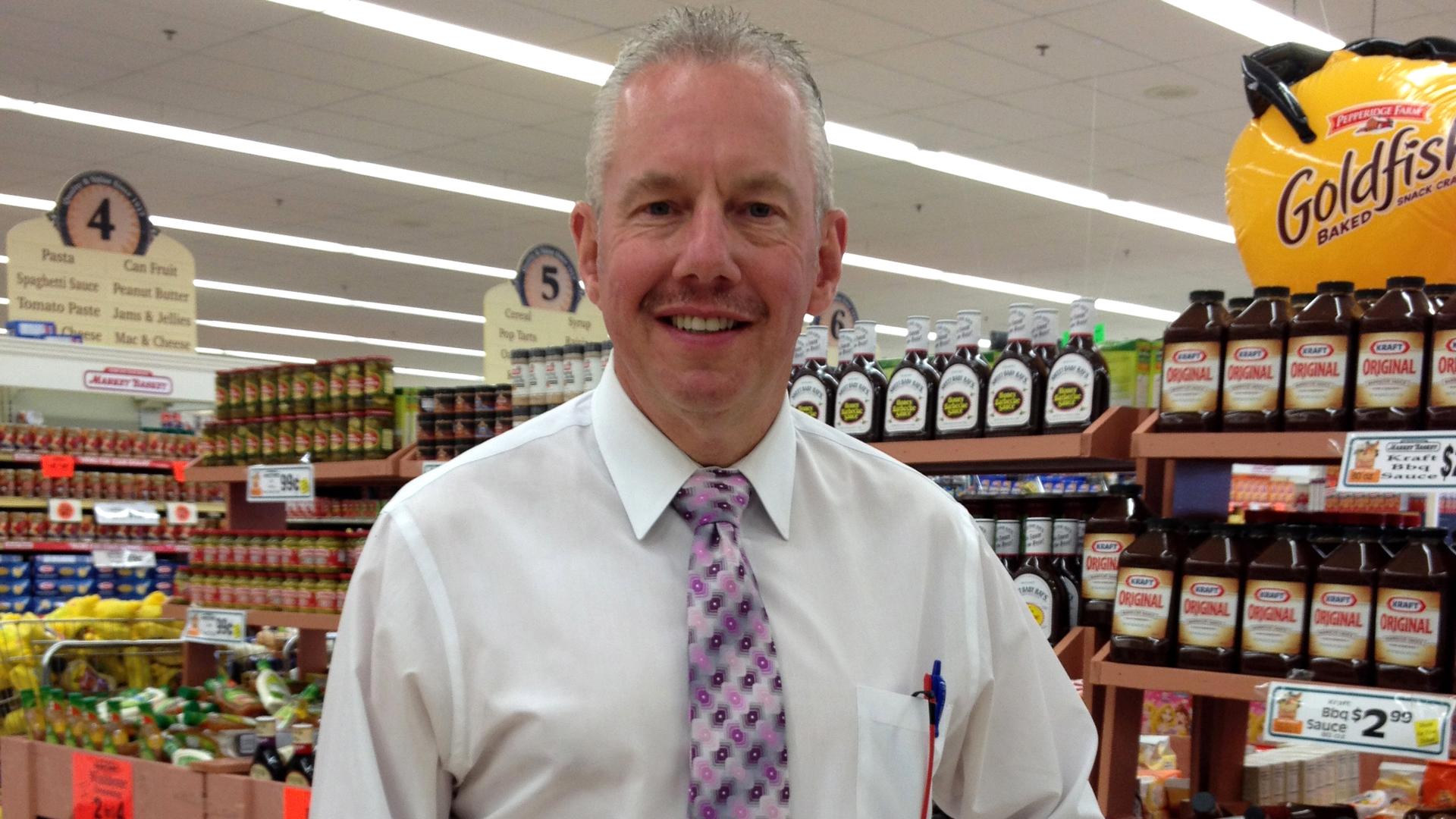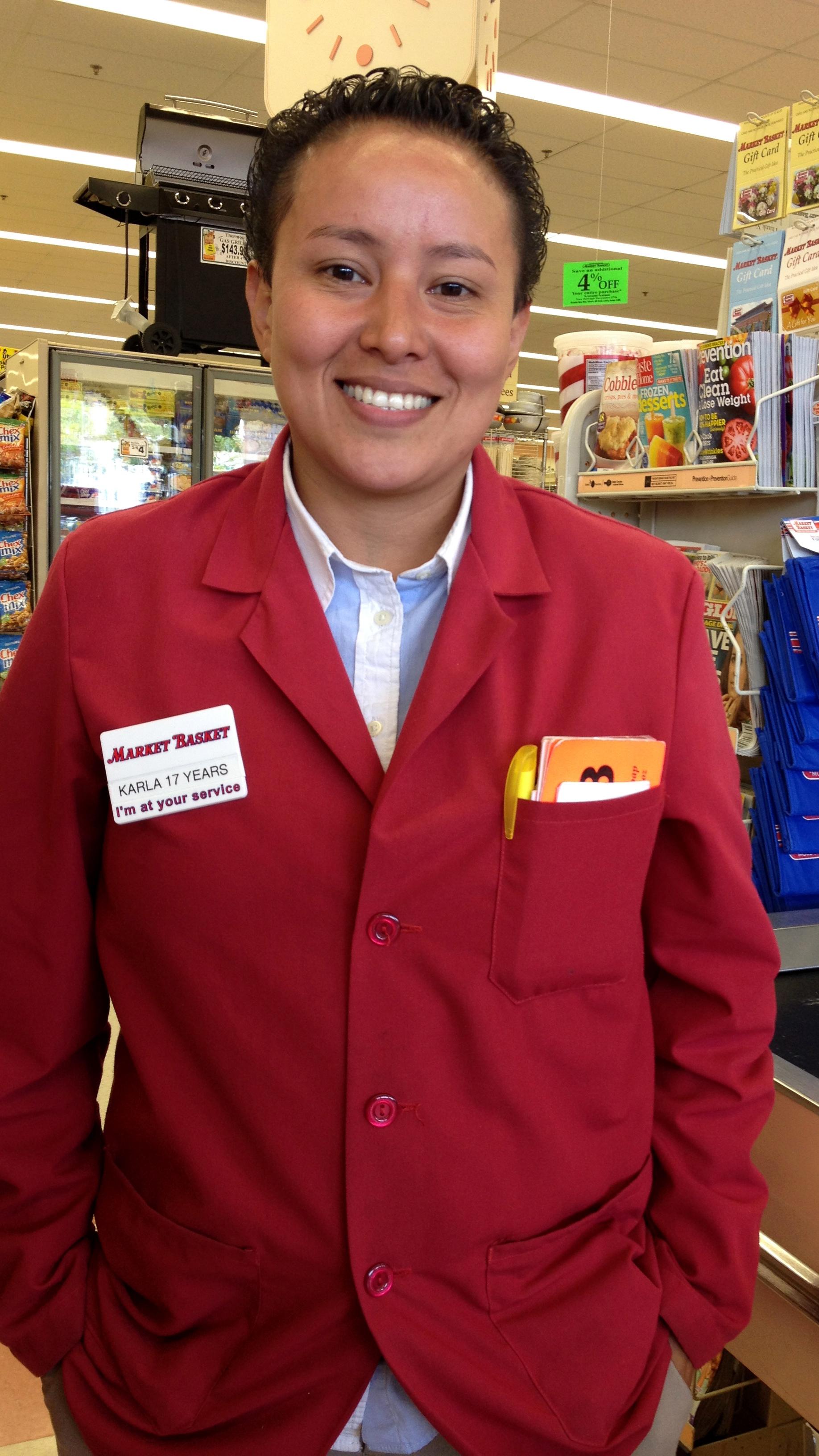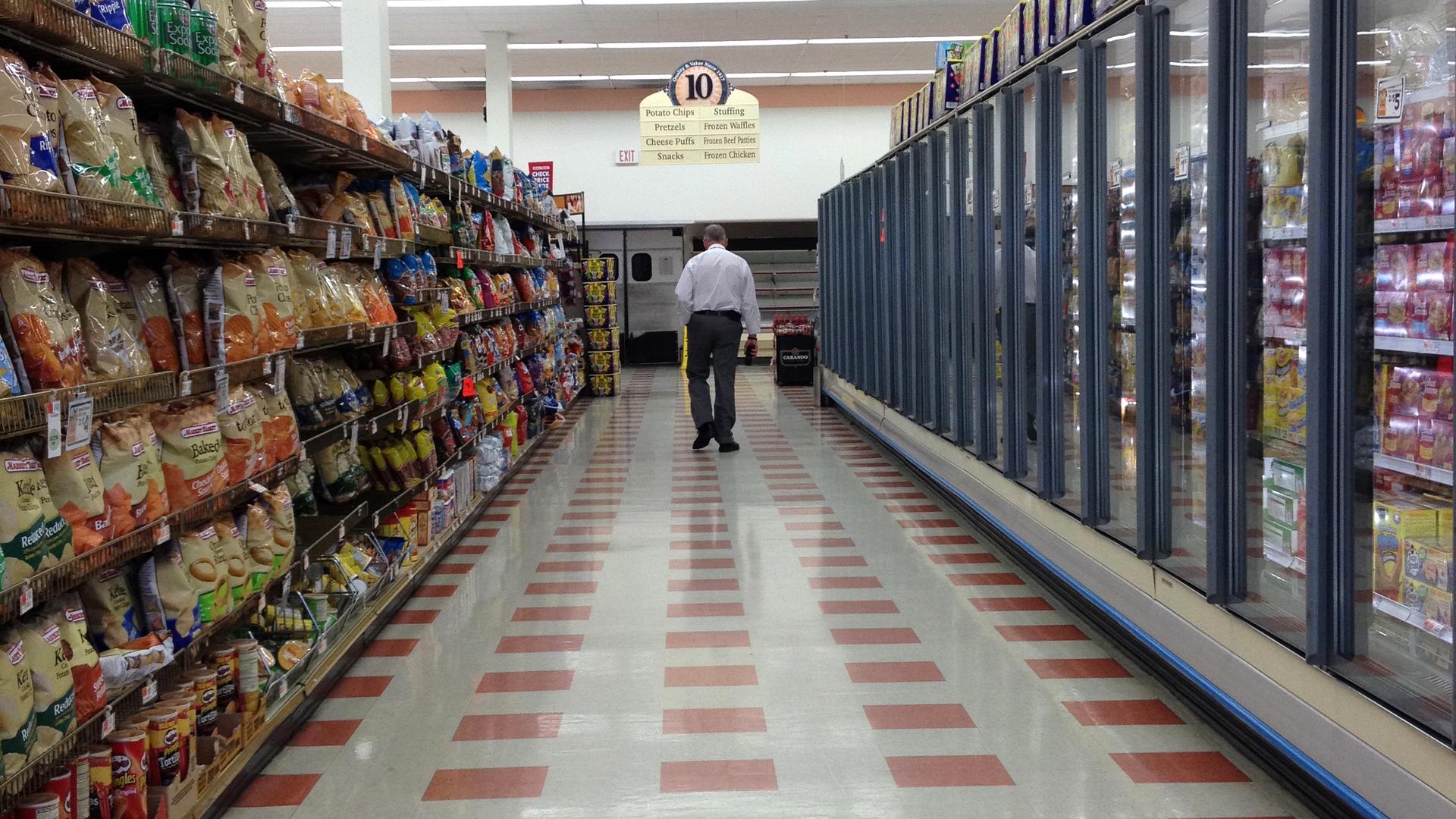Michael Dunleavy walks down an empty aisle of the Market Basket grocery store he manages in Somerville, Mass. He began working at Market Basket when he was 16 as a bagger and worked his way up to store director.
The scene at the Market Basket in Somerville, Mass., was like something out of Cold War-era Russia.
I had gone to my neighborhood grocery store to buy a carrot, but what I found were empty shelves and a produce section devoid of all produce. More than a week later, nothing has changed.
"We don't have a potato in the building," says Michael Dunleavy, the store's director. "We don't have a carrot, not a piece of watermelon — we have nothing to sell." There are only a couple of shoppers in the store. It's so quiet, you can hear the eerie hum of refrigerator cases.
Market Basket, a chain of 71 grocery stores across New England, is like a super-sized bodega: low prices and ingredients that run the gamut from cereal to tomatillos to spices you might not come across in any other grocery store. And right now, the chain is in disarray. Workers at its stores are conducting a massive protest — but why?
The first thing to know is that Market Basket is a family-owned chain. It started in 1916 when Athansios "Arthur" Demoulas, a Greek immigrant, opened the first store in Lowell, Mass., to sell fresh lamb — a hard-to-find ingredient for Greek immigrants at the time. Today the story is very successful, earning more than $4 billion in revenue last year.
But workers in its stores, many of whom are immigrants, are actively encouraging loyal customers not to shop there. It's not a labor protest, though — it's aimed at reinstating the chain's CEO.
The battle for control of the chain is playing out between two cousins, both named Arthur Demoulas. Last month, the board of directors fired Arthur T. Demoulas. Employees says Arthur S. Demoulas orchestrated that firing, and that's what has them so upset.
To hear it from the employees like Dunleavy, who started bagging groceries at the store 36 years ago, Arthur T. gave the employees respect. He also gave them a bonus program, a profit sharing program and fantastic benefits. That all translates into loyalty.
And that's why there are empty produce shelves. The workers at this Somerville store are telling their customers to shop elsewhere. The Market Basket warehouse refuses to make any deliveries. And it's having a huge impact: Sales at this store are down 90 percent and the company is losing millions.
All of this to bring back Arthur T.? "Arthur T. Demoulas has taken care of his employees like his own family," Dunleavy says.
And at the Somerville store, that family is diverse. Market Basket is known as place where immigrants come both to work and to shop. The store stocks a big variety of foods from home and keep prices low.
"Whatever country you come from, whatever you need or you want … you'll find it here," says Karla Hernández, a long-time Market Basket employee. She came to the US from El Salvador when she was eight years old. Her family went to Market Basket every Saturday to do the week's shopping. Eventually, her brother ended up getting a job at their local Market Basket and then she followed suit.
"I came here when I was 16 and started working in the yogurt section," Hernández says. That was 17 years ago. Now she manages the front of the store. It's a common story at Market Basket, which is known for employing families of immigrants for long spans of time.
"There's like 71 stores, right? And if you go to the warehouse you got all the United Nations in there," Hernández says. "You get to work with a lot of people from different places — Iraq, Iran and all those people down there in the Middle East."

Besides the employees, the customers at Market Basket — especially at this location in Somerville — speak a variety of languages. Chances are good that no matter what language you speak, someone will understand you.
"There's Portugese, Brazilian, Haiti, Creole, French — obviously number one is Spanish — Greek, there's Nepali … we got everything," Hernández says.
So why would a staff of people from all around the world risk bringing down their massive company just to reinstate a CEO?
"He's dedicated to us. We're dedicated to him," Hernández says. You can see it on the walls: Posters and flyers of Arthur T. with the words "I Believe" printed underneath, a riff on the iconic Obama "Hope" posters.
Outside, workers stand in front of the parking lot before their shifts start. One of them is 19-year-old Kevin Perez-Barbosa, who's only been working for Market Basket for a month.
He says he's not the first in his family to work at Market Basket. Years ago, his parents came to the US from El Salvador and Cape Verde. Like him, they both worked jobs at Market Basket in their teens — he's just continuing the tradition.
"It's a great place to start off if you want to get a job," he says. "And like, all the experience you're getting could help you out in the future, too."
We look out at the empty parking lot. Before the protests and the boycott, you'd be hard-pressed to find a parking spot. "It's killing us," Perez-Barbosa says. "But we just want Market Basket to get back to normal."
The scene at the Market Basket in Somerville, Mass., was like something out of Cold War-era Russia.
I had gone to my neighborhood grocery store to buy a carrot, but what I found were empty shelves and a produce section devoid of all produce. More than a week later, nothing has changed.
"We don't have a potato in the building," says Michael Dunleavy, the store's director. "We don't have a carrot, not a piece of watermelon — we have nothing to sell." There are only a couple of shoppers in the store. It's so quiet, you can hear the eerie hum of refrigerator cases.
Market Basket, a chain of 71 grocery stores across New England, is like a super-sized bodega: low prices and ingredients that run the gamut from cereal to tomatillos to spices you might not come across in any other grocery store. And right now, the chain is in disarray. Workers at its stores are conducting a massive protest — but why?
The first thing to know is that Market Basket is a family-owned chain. It started in 1916 when Athansios "Arthur" Demoulas, a Greek immigrant, opened the first store in Lowell, Mass., to sell fresh lamb — a hard-to-find ingredient for Greek immigrants at the time. Today the story is very successful, earning more than $4 billion in revenue last year.
But workers in its stores, many of whom are immigrants, are actively encouraging loyal customers not to shop there. It's not a labor protest, though — it's aimed at reinstating the chain's CEO.
The battle for control of the chain is playing out between two cousins, both named Arthur Demoulas. Last month, the board of directors fired Arthur T. Demoulas. Employees says Arthur S. Demoulas orchestrated that firing, and that's what has them so upset.
To hear it from the employees like Dunleavy, who started bagging groceries at the store 36 years ago, Arthur T. gave the employees respect. He also gave them a bonus program, a profit sharing program and fantastic benefits. That all translates into loyalty.
And that's why there are empty produce shelves. The workers at this Somerville store are telling their customers to shop elsewhere. The Market Basket warehouse refuses to make any deliveries. And it's having a huge impact: Sales at this store are down 90 percent and the company is losing millions.
All of this to bring back Arthur T.? "Arthur T. Demoulas has taken care of his employees like his own family," Dunleavy says.
And at the Somerville store, that family is diverse. Market Basket is known as place where immigrants come both to work and to shop. The store stocks a big variety of foods from home and keep prices low.
"Whatever country you come from, whatever you need or you want … you'll find it here," says Karla Hernández, a long-time Market Basket employee. She came to the US from El Salvador when she was eight years old. Her family went to Market Basket every Saturday to do the week's shopping. Eventually, her brother ended up getting a job at their local Market Basket and then she followed suit.
"I came here when I was 16 and started working in the yogurt section," Hernández says. That was 17 years ago. Now she manages the front of the store. It's a common story at Market Basket, which is known for employing families of immigrants for long spans of time.
"There's like 71 stores, right? And if you go to the warehouse you got all the United Nations in there," Hernández says. "You get to work with a lot of people from different places — Iraq, Iran and all those people down there in the Middle East."

Besides the employees, the customers at Market Basket — especially at this location in Somerville — speak a variety of languages. Chances are good that no matter what language you speak, someone will understand you.
"There's Portugese, Brazilian, Haiti, Creole, French — obviously number one is Spanish — Greek, there's Nepali … we got everything," Hernández says.
So why would a staff of people from all around the world risk bringing down their massive company just to reinstate a CEO?
"He's dedicated to us. We're dedicated to him," Hernández says. You can see it on the walls: Posters and flyers of Arthur T. with the words "I Believe" printed underneath, a riff on the iconic Obama "Hope" posters.
Outside, workers stand in front of the parking lot before their shifts start. One of them is 19-year-old Kevin Perez-Barbosa, who's only been working for Market Basket for a month.
He says he's not the first in his family to work at Market Basket. Years ago, his parents came to the US from El Salvador and Cape Verde. Like him, they both worked jobs at Market Basket in their teens — he's just continuing the tradition.
"It's a great place to start off if you want to get a job," he says. "And like, all the experience you're getting could help you out in the future, too."
We look out at the empty parking lot. Before the protests and the boycott, you'd be hard-pressed to find a parking spot. "It's killing us," Perez-Barbosa says. "But we just want Market Basket to get back to normal."
